Figures 2.8 (a) and (b) show the field lines of a positive and negative point charge respectively.
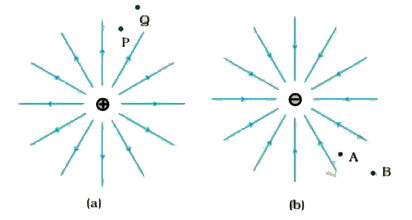
(a) Give the signs of the potential difference VP−VQ:VB−VA.
(b) Give the sign of the potential energy difference of a small negative charge between the points Q and P, A and B.
(c) Give the sign of the work done by the field in moving a small positive charge from Q to P.
(d) Give the sign of the work done by the external agency in moving a small negative charge from B to A.
(e) Does the kinetic energy of a small negative charge increase or decrease in going from B to A?Solution in Telugu
(a) As V∝1r,VP>VQ, Thus, (VP−VQ) is positive. Also VB is less negative than VA. Thus VB>VA or (VB−VA) is positive.
(b) A small negative charge will be attracted towards positive charge. The negative charge moves from higher potential energy to lower potential energy. Therefore the sign of potential energy difference of a small negative charge between Q and P is positive.
Similarly, (P.E)A>(P.E)B and hence sign of potential energy differences is positive.
(c) In moving a small positive charge from Q to P, work has to be done by an external agency against the electric field. Therefore, work done by the field is negative.
(d) In moving a small negative charge from B to A work has to be done by the external agency. It is positive.
(e) Due to force of repulsion on the negative charge, velocity decreases and hence the kinetic energy decreases in going from B to A.
Similar Questions
Figures 2.8 (a) and (b) show the field lines of a positive and negative point charge respectively. (a) Give the signs of the potential difference V_(P)-V_(Q): V_(B)-V_(A) . (b) Give the sign of the potential energy difference of a small negative charge between the points Q and P, A and B. (c) Give the sign of the work done by the field in moving a small positive charge from Q to P. (d) Give the sign of the work done by the external agency in moving a small negative charge from B to A. (e) Does the kinetic energy of a small negative charge increase or decrease in going from B to A?
07:21View SolutionFigures (a) and (b) show the field lines of a positive and negative point charge respectively. (a) Give the signs of the potential difference V_(P)-V_(Q), V_(B)-V_(A) . (b) Give the sign of the potential energy difference of a small negative charge between the points Q and P, A and B. (c) Give the sign of the work done by the field in moving a small positive charge from Q to P. (d) Give the sign of the work done by the external agency in moving a small negative charge from B to A. (e) Does the kinetic energy of a small negative charge increase or decrease in going from B to A?
07:50View SolutionFig (a) and (b) show the field lines of a single positive and negative charges respectively .
Give the signs of the potential difference : VP−VQ,VB−VA
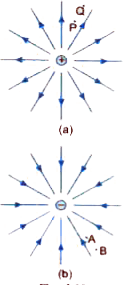 View Solution
View SolutionFig (a) and (b) show the field lines of a single positive and negative charges respectively .
Give the sign of the potential energy difference of a small negative charge between the points Q and P , A and B .
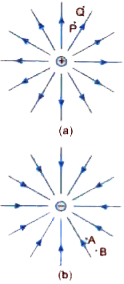 View Solution
View SolutionFig (a) and (b) show the field lines of a single positive and negative charges respectively .
Give the sign of the work done by the field in moving a small positive charge from Q to P .
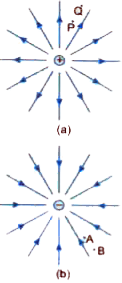 View Solution
View SolutionFig (a) and (b) show the field lines of a single positive and negative charges respectively . Give the sign of the work done by an external agency in moving a small negative charge from B to A .
View SolutionFig shows the electric field lines due to a point positive charge. P and Q are two point in the electric field.
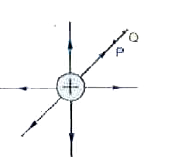
i) What is the sign pf VP−VQ?
ii) What is the sign of the potential energy difference of a small negative charge between Q and P?
iii) What is the sign of work done by the field in moving a small positive charge from Q to P?
iv)What is the sign of work done by external agent in moving a positive charge from Q to P?View SolutionFigs, (a) and (b) show the field lines of a positive and negative point charge respectively. Give the signs of the ‘potential differences (V_p-V_Q),(V_B-V_A)
04:28View Solution

